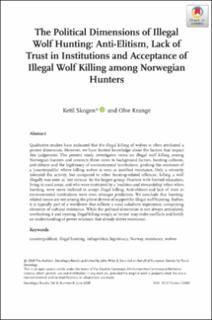The Political dimensions of illegal wolf hunting: anti-elitism, lack of trust in institutions and acceptance of illegal wolf killing among Norwegian hunters
Journal article
Published version

Åpne
Permanent lenke
https://hdl.handle.net/11250/2660860Utgivelsesdato
2020Metadata
Vis full innførselSamlinger
- Scientific publications [1392]
Originalversjon
10.1111/soru.12309Sammendrag
Qualitative studies have indicated that the illegal killing of wolves is often attributed a protest dimension. However, we have limited knowledge about the factors that impact this judgement. The present study investigates views on illegal wolf killing among Norwegian hunters and connects these views to background factors, hunting cultures, anti-elitism and the legitimacy of environmental institutions, probing the existence of a ‘counterpublic’ where killing wolves is seen as justified resistance. Only a minority tolerated the activity, but compared to other hunting-related offences, killing a wolf illegally was seen as ‘not serious’ by the largest group. Hunters with limited education, living in rural areas, and who were motivated by a ‘tradition and stewardship’ ethos when hunting, were more inclined to accept illegal killing. Anti-elitism and lack of trust in environmental institutions were even stronger predictors. We conclude that huntingrelated issues are not among the prime drivers of support for illegal wolf hunting. Rather, it is typically part of a worldview that reflects a rural subaltern experience, comprising elements of cultural resistance. While the political dimension is not always articulated, overlooking it and treating illegal killing simply as ‘crime’ may stoke conflicts and fortify an understanding of power relations that already drives resistance.
